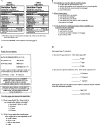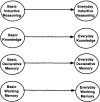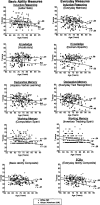Everyday cognition: age and intellectual ability correlates
- PMID: 10632150
- PMCID: PMC2904910
- DOI: 10.1037//0882-7974.14.4.627
Everyday cognition: age and intellectual ability correlates
Abstract
The primary aim of this study was to examine the relationship between a new battery of everyday cognition measures, which assessed 4 cognitive abilities within 3 familiar real-world domains, and traditional psychometric tests of the same basic cognitive abilities. Several theoreticians have argued that everyday cognition measures are somewhat distinct from traditional cognitive assessment approaches, and the authors investigated this assertion correlationally in the present study. The sample consisted of 174 community-dwelling older adults from the Detroit metropolitan area, who had an average age of 73 years. Major results of the study showed that (a) each everyday cognitive test was strongly correlated with the basic cognitive abilities; (b) several basic abilities, as well as measures of domain-specific knowledge, predicted everyday cognitive performance; and (c) everyday and basic measures were similarly related to age. The results suggest that everyday cognition is not unrelated to traditional measures, nor is it less sensitive to age-related differences.
Figures




Similar articles
-
Well- and ill-defined measures of everyday cognition: relationship to older adults' intellectual ability and functional status.Psychol Aging. 2002 Mar;17(1):101-115. doi: 10.1037/0882-7974.17.1.101. Psychol Aging. 2002. PMID: 11931279 Free PMC article.
-
Everyday cognition and mortality: performance differences and predictive utility of the Everyday Cognition Battery.Psychol Aging. 2008 Mar;23(1):216-21. doi: 10.1037/0882-7974.23.1.216. Psychol Aging. 2008. PMID: 18361669
-
Cognitive Predictors of Everyday Problem Solving across the Lifespan.Gerontology. 2017;63(4):372-384. doi: 10.1159/000459622. Epub 2017 Mar 9. Gerontology. 2017. PMID: 28273664 Free PMC article.
-
[The estimation of premorbid intelligence levels in French speakers].Encephale. 2005 Jan-Feb;31(1 Pt 1):31-43. doi: 10.1016/s0013-7006(05)82370-x. Encephale. 2005. PMID: 15971638 French.
-
Investment and intellect: a review and meta-analysis.Psychol Bull. 2013 Jul;139(4):841-69. doi: 10.1037/a0030746. Epub 2012 Dec 10. Psychol Bull. 2013. PMID: 23231531 Review.
Cited by
-
No Evidence That Cognitive and Physical Activities Are Related to Changes in EEG Markers of Cognition in Older Adults at Risk of Dementia.Front Aging Neurosci. 2021 Mar 19;13:610839. doi: 10.3389/fnagi.2021.610839. eCollection 2021. Front Aging Neurosci. 2021. PMID: 33815087 Free PMC article.
-
The ACTIVE study: study overview and major findings.J Aging Health. 2013 Dec;25(8 Suppl):3S-20S. doi: 10.1177/0898264313518133. J Aging Health. 2013. PMID: 24385638 Free PMC article. No abstract available.
-
Using Variable Priority Training to Examine Video Game-Related Gains in Cognition.J Cogn Enhanc. 2020 Sep;4(3):274-284. doi: 10.1007/s41465-019-00148-1. Epub 2019 Aug 28. J Cogn Enhanc. 2020. PMID: 33283142 Free PMC article.
-
Judgment in older adults: development and psychometric evaluation of the Test of Practical Judgment (TOP-J).J Clin Exp Neuropsychol. 2007 Oct;29(7):752-67. doi: 10.1080/13825580601025908. J Clin Exp Neuropsychol. 2007. PMID: 17896200 Free PMC article.
-
The brief case for everyday problems: a proposal of two brief alternate forms of the Everyday Problems Test.Eur J Ageing. 2022 Oct 21;19(4):1519-1528. doi: 10.1007/s10433-022-00734-x. eCollection 2022 Dec. Eur J Ageing. 2022. PMID: 36506659 Free PMC article.
References
-
- Akaike H. Factor analysis and AIC. Psychometrika. 1987;52:317–332.
-
- Baird A, Brines B, Stoor E. What tasks are the most important for successful independent living in elders?. annual scientific meeting of the Gerontological Society of America; Washington, DC. Nov, 1992.
-
- Baltes MM, Mayr U, Borchelt M, Maas I, Wilms H-U. Everyday competence in old and very old age: An inter-disciplinary perspective. Ageing and Society. 1993;13:657–680.
-
- Baltes MM, Wahl H-W, Schmid-Furstoss U. The daily life of elderly Germans: Activity patterns, personal control, and functional health. Journal of Gerontology: Psychological Sciences. 1990;45:173–179. - PubMed
-
- Baltes PB. Theoretical propositions of life-span developmental psychology: On the dynamics between growth and decline. Developmental Psychology. 1987;23:611–626.

